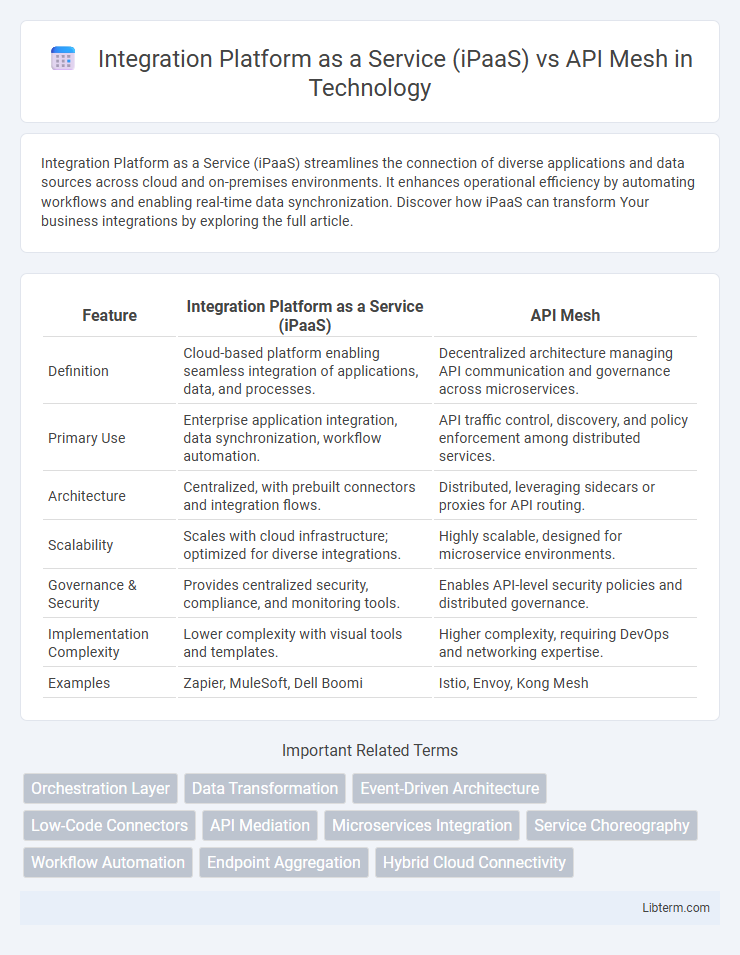Integration Platform as a Service (iPaaS) streamlines the connection of diverse applications and data sources across cloud and on-premises environments. It enhances operational efficiency by automating workflows and enabling real-time data synchronization. Discover how iPaaS can transform Your business integrations by exploring the full article.
Table of Comparison
| Feature | Integration Platform as a Service (iPaaS) | API Mesh |
|---|---|---|
| Definition | Cloud-based platform enabling seamless integration of applications, data, and processes. | Decentralized architecture managing API communication and governance across microservices. |
| Primary Use | Enterprise application integration, data synchronization, workflow automation. | API traffic control, discovery, and policy enforcement among distributed services. |
| Architecture | Centralized, with prebuilt connectors and integration flows. | Distributed, leveraging sidecars or proxies for API routing. |
| Scalability | Scales with cloud infrastructure; optimized for diverse integrations. | Highly scalable, designed for microservice environments. |
| Governance & Security | Provides centralized security, compliance, and monitoring tools. | Enables API-level security policies and distributed governance. |
| Implementation Complexity | Lower complexity with visual tools and templates. | Higher complexity, requiring DevOps and networking expertise. |
| Examples | Zapier, MuleSoft, Dell Boomi | Istio, Envoy, Kong Mesh |
Understanding iPaaS: Definition and Core Functions
Integration Platform as a Service (iPaaS) is a cloud-based solution designed to connect applications, data, and services across different environments, facilitating seamless data flow and process automation. Key functions of iPaaS include application integration, data transformation, API management, and workflow orchestration, enabling businesses to unify disparate systems without extensive custom coding. Unlike API Mesh, which focuses on managing APIs' communication and security within microservices architectures, iPaaS provides a broader integration framework encompassing various integration patterns and enterprise connectivity needs.
What is API Mesh? Key Features and Benefits
API Mesh is a modern architectural layer that manages and orchestrates API interactions across multiple microservices in a distributed environment. Key features include dynamic API discovery, centralized traffic control, fine-grained security policies, and real-time observability, enabling seamless service communication and governance. Benefits of API Mesh involve improved scalability, enhanced API performance, simplified integration management, and stronger security enforcement within complex microservice ecosystems.
iPaaS vs API Mesh: Fundamental Differences
Integration Platform as a Service (iPaaS) provides a cloud-based solution designed to connect applications, data, and processes across different environments through pre-built connectors and workflow automation. API Mesh focuses on managing, securing, and orchestrating APIs within a microservices architecture, emphasizing real-time API-to-API communication and observability. The fundamental difference lies in iPaaS enabling broad integration across diverse systems at the process level, while API Mesh optimizes API interactions and governance within service networks.
Integration Use Cases: When to Choose iPaaS
iPaaS is ideal for integrating cloud applications, automating workflows, and connecting disparate systems with low-code tools, supporting business processes like CRM, ERP, and marketing automation. It offers centralized management for data transformation, protocol mediation, and pre-built connectors, making it suitable for complex, multi-cloud, and hybrid environments requiring rapid integration deployment. Choose iPaaS when scalable, end-to-end orchestration and easy integration with SaaS, on-premises applications, and data sources are priorities.
API Mesh in Modern Architectures: Ideal Scenarios
API Mesh in modern architectures excels in managing and securing complex API interactions across distributed microservices, enabling seamless service discovery, traffic control, and policy enforcement. Ideal scenarios include large-scale enterprises adopting microservices or hybrid cloud environments where dynamic API composition and real-time observability are critical. API Mesh enhances developer productivity and system reliability by automating API lifecycle management and providing granular control over API communication flows.
Scalability and Performance: iPaaS vs API Mesh
iPaaS offers centralized integration with scalable cloud-based infrastructure, enabling seamless connectivity across diverse applications while handling increased workloads efficiently. API Mesh provides decentralized, fine-grained API management designed for microservices, optimizing performance through localized routing and reduced latency. Scalability in iPaaS excels with broad enterprise integration, whereas API Mesh prioritizes high-performance communication within distributed service architectures.
Security Considerations for iPaaS and API Mesh
Integration Platform as a Service (iPaaS) provides centralized security controls including data encryption, identity and access management (IAM), and compliance certifications to protect data flows across cloud and on-premises applications. API Mesh architecture enhances API security by enforcing fine-grained policies such as mutual TLS, OAuth, and rate limiting at the mesh layer, enabling granular authorization and monitoring for API communication. Both iPaaS and API Mesh require robust security strategies, but iPaaS emphasizes unified governance and compliance, while API Mesh focuses on dynamic, distributed security enforcement within microservices environments.
Cost and Resource Implications
Integration Platform as a Service (iPaaS) typically involves higher upfront and ongoing subscription costs due to its comprehensive tools and managed infrastructure, which can reduce internal resource demands. API Mesh, often deployed within existing environments, tends to incur lower direct platform costs but requires significant in-house expertise and resources for setup, maintenance, and scalability. Choosing between iPaaS and API Mesh depends on balancing platform expenses against internal resource availability for development, operations, and support.
Integration Complexity: Challenges and Solutions
Integration Platform as a Service (iPaaS) simplifies complex integrations by providing a centralized hub for connecting disparate applications and data sources through pre-built connectors and low-code interfaces, reducing the need for extensive custom coding. API Mesh addresses integration complexity by offering dynamic API discovery, security, governance, and orchestration across microservices, enabling real-time interactions and enhanced scalability in distributed architectures. Combining iPaaS with API Mesh solutions often results in optimized integration workflows, improved visibility, and easier management of both synchronous and asynchronous communication challenges.
Choosing Between iPaaS and API Mesh: Decision Criteria
Choosing between Integration Platform as a Service (iPaaS) and API Mesh depends on the complexity of integration requirements and the architectural style. iPaaS offers pre-built connectors and workflow automation ideal for integrating diverse cloud and on-premises applications rapidly. In contrast, API Mesh provides granular control over API management and service discovery, suited for microservices architectures demanding scalability and real-time communication governance.
Integration Platform as a Service (iPaaS) Infographic

 libterm.com
libterm.com